Central issues of Election 2012
By David Lauter
hoever wins the presidential election in November will confront urgent problems: Should tax cuts scheduled to expire be renewed? Should federal spending be cut to reduce the deficit or would that weaken an already lackluster economy? After one of the hottest summers on record, has the time come for the U.S. to adopt policies to slow climate change? Have sanctions against Iran impeded its nuclear program, and if not, does that make a military strike necessary? What to do about immigration?
Presidential campaigns only incidentally debate such issues. The warring camps seek to motivate major groups of voters by picking one or two issues to wield as weapons. The process simplifies — and often distorts — where the candidates stand.
| Advertisement |
In some cases, campaigns exaggerate small differences to create a contrast. On foreign policy, for example, President Obama and his Republican challenger, Mitt Romney, have few differences in their substantive positions, although neither camp wants to admit that.
In other cases, candidates differ greatly but avoid spelling out their policies, fearing the details will prove less popular than generalities.
Romney, for example, says he wants to increase defense spending and cut tax rates by 20% while still balancing the budget. He hasn't said what he would do to make the numbers work. On a number of other major issues, Romney has avoided specifics, trying to keep the focus on Obama's economic record rather than debate policy choices.
Obama has been more forthcoming, but has elided some issues. He says, for example, that in a second term he would seek action on global warming, but has made only limited proposals. The "cap and trade" plan the House passed during his first year in office proved a nonstarter in the Senate and was blamed for contributing to Democrats' defeat in the 2010 midterm elections.
But campaigns do force candidates to make choices and promises. A president doesn't always get his way on those choices — many policies require legislation, which means a vote in Congress. Still, the choice of a president opens some options and closes others. Strip away the rhetoric and obfuscations of the campaign, and those differences stand out. What follows is our best effort to make clear where Obama and Romney stand on several major domestic and foreign policy issues that will face whichever man wins.
Oct. 9, 2012
For an election in which voters say the economy is their top concern, Obama and Romney have had relatively little to say about short-term steps to solve the nation's immediate economic problems — high unemployment and an ailing housing market.
Each has talked about longer-term policies — something about which they have deep philosophical disagreements. Both agree that government and private enterprise have a role to play. Romney is not a Ron Paul libertarian, and Obama is not a socialist. But within that broad framework, the emphasis of their policies is very different.
Oct. 10, 2012

Obama stresses the role that government plays in economic growth. To expand, he says, the economy needs an educated workforce, up-to-date roads, bridges, railroads, ports and communications networks and the most modern technology. That means the government needs to spend money to build schools and highways, he says, or to help bring solar power or wind-energy technologies to the market.
He expresses his view that economic growth involves the entire society in words that Democrats have used at least since Franklin D. Roosevelt — as in the speech in Virginia during the summer from which Republicans grabbed their most prominent attack line:
"If you were successful, somebody along the line gave you some help. There was a great teacher somewhere in your life. Somebody helped to create this unbelievable American system that we have that allowed you to thrive. Somebody invested in roads and bridges. If you've got a business — you didn't build that. Somebody else made that happen. The Internet didn't get invented on its own. Government research created the Internet so that all the companies could make money off the Internet. The point is that when we succeed, we succeed because of our individual initiative, but also because we do things together."
Romney, by contrast, focuses on the role of business owners in taking risks that generate jobs. Government should get out of the way of those risk-takers by spending less, taxing less and regulating less, he says. Do that, and entrepreneurs will invest in new businesses that will create jobs.
He draws on an even longer-standing American rhetorical tradition in his speeches on individual enterprise and economic growth:
"I don't want to transform America; I want to restore the values of economic freedom, opportunity and small government that have made this nation the leader it is," he said in a speech in Wisconsin in March that he has repeated frequently.
"The best thing we can do for the economic well-being of the people of America is not to grow government; it is to restore freedom and opportunity. It is opportunity that has always driven America and defined us as Americans," he continued. "Government must make America the best place in the world for entrepreneurs, innovators, small business and big business — for job creators of all kinds. Business is not the enemy. It is the friend of jobs, of rising wages, and of the revenues government needs to care for the poor and the elderly, and to provide for the national defense."
By contrast, both men have been comparatively reticent about the short term, although for different reasons. Romney opposes most government intervention in the economy on philosophical grounds; Obama supports it in theory, but doesn't have the votes in Congress or the public support for a second round of economic stimulus.
Obama has proposed some short-term steps on jobs, mostly in an economic package he put forward last fall, which he called the American Jobs Act. Congress passed one element of his plan — an extension of the payroll tax cut — but blocked other proposals, which included money for states and local government to hire more teachers and federal funds to repair schools.
On housing, Obama has taken steps he could do without Congress. Most aim to ease the way for homeowners to refinance their mortgages at current low interest rates. Housing-market analysts have said the programs could help a couple of million homeowners, but as of this spring, the country still had more than 14 million homeowners who owed more than their homes were worth. Larger-scale programs repeatedly have foundered because of political opposition to any approach that appears to "bail out" some homeowners.
Oct. 11, 2012
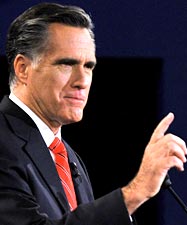
Romney argues that short-term stimulus doesn't work and merely runs up the government's debt, weakening the economy in the long run. Similarly, he has opposed government intervention in the housing market, saying it would only make the problem worse by stretching out the inevitable.
"Don't try and stop the foreclosure process; let it run its course and hit the bottom," he told the Las Vegas Review-Journal in an interview last fall.
Three months later, in a discussion with homeowners in the Tampa, Fla., area shortly before that state's primary, Romney seemed more open to intervention. "The idea that somehow this is going to cure itself by itself is probably not real," he told the group. "There's going to have to be a much more concerted effort to work with the lending institutions and help them take action, which is in their best interest and the best interest of the homeowners."
Romney has not followed up with a specific proposals on that subject.
To see how the broad, philosophical differences between the two candidates work out in concrete terms, examine their contrasting proposals on taxes, the deficit and government spending.
Oct. 12, 2012
12:51 p.m.
Many parts of the federal tax code expire on Dec. 31, including tax cuts adopted under Obama and President George W. Bush. What to do about them will be among the first decisions the November winner will have to make.
That choice will drive other decisions — how much to spend, how big a deficit to accept, what to keep and what to discard.
Obama and Romney disagree over how much the federal government should tax and who should pay. Obama would increase the overall tax level; Romney would shrink it. Obama would raise upper-income taxes. Romney would cut taxes for many upper-income Americans, but would raise them for at least the bottom fifth, those who earn less than about $20,000 a year.
Oct. 12, 2012
12:56 p.m.

Obama would extend the Bush-era tax cuts for most taxpayers for another year. He advocates the following changes that would raise taxes:
• Allow tax rates to go up on incomes over $250,000 for couples filing jointly and $200,000 for singles; the current top rates of 33% and 35% would rise to the Clinton-era levels of 36% and 39.6%.
• Tax long-term capital gains at 20% rather than the current 15% for the same high-income taxpayers.
• Phase out personal exemptions and itemized deductions for the same high-income taxpayers, with the exemptions fully phased out for incomes above $376,950.
He advocates these changes that would lower taxes:
• Freeze the alternative minimum tax at 2009 levels, indexed for inflation to prevent the tax from expanding to cover an estimated 31 million additional taxpayers.
• Extend some tax breaks for business that are scheduled to expire.
• Keep tax breaks for low- and middle-income families with children that were put in place as part of the economic stimulus law in 2009.
In total, over the next decade, Obama would extend Bush-era tax cuts that would reduce federal revenue by $1.5 trillion. Freezing the alternative minimum tax would cut tax revenue by $1.9 trillion compared with existing law. Obama would make additional tax cuts of about $420 billion. His upper-income tax increases would increase taxes by about $2.1 trillion.
Whether Obama's plan adds up to a tax increase or a tax cut depends on whether it's compared with the current situation, in which the Bush tax cuts are in effect, or the existing law, which calls for the Bush cuts to expire automatically at the end of this year. Compared with the current situation, Obama's proposals add up to a $1.7-trillion tax increase over 10 years. Compared with existing law, they amount to a $2.8-trillion tax cut.
Oct. 12, 2012
12:56 p.m.
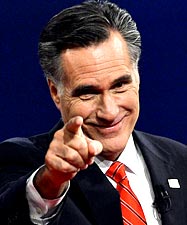
Romney's chief proposal is a 20% reduction in tax rates. He has said he would offset the revenue lost to the Treasury by eliminating existing deductions and credits. But he hasn't said which tax preferences he would wipe out, making a full evaluation of his plan impossible. Nor has he said what he would do if Congress passed the tax reduction but failed to pass offsetting tax increases. If Congress didn't agree to eliminate existing deductions and credits, his options would be to go for a smaller tax cut or accept a bigger deficit.
Romney advocates these changes, all of which would lower taxes except for the final one, which would raise taxes for lower-income families:
• Keep in place all of the tax cuts adopted during the Bush administration, including those on high-income taxpayers.
• Cut income tax rates by an additional 20%.
• Repeal the Estate Tax.
• Repeal the alternative minimum tax.
• End federal taxes on dividends and interest for married couples filing jointly with income up to $200,000 or individuals with income up to $100,000.
• Cut corporate taxes.
• Repeal tax increases that were part of the Obama health reform law.
• End tax breaks for low- and middle-income families put in place in the economic stimulus law. About 1 in 5 low-income taxpayers would be affected and would see an average tax increase of just over $900 a year.
Overall, Romney's proposals would reduce federal revenue by about $4.8 trillion over 10 years in addition to the revenue reduction caused by extending all of the Bush-era tax cuts. But the total net impact of Romney's plan would depend on what existing deductions and credits, if any, Congress would agree to repeal.
Oct. 12, 2012
1:04 p.m.
Currently, federal revenues cover about two-thirds of federal spending. The government borrows money to fill the gap. The more the government borrows, the bigger the national debt, which began rising sharply during Bush's presidency and has accelerated more under Obama.
Fail to bring spending in line with revenue and the debt threatens to spiral out of control. Cut spending or raise taxes too fast, and the economy most likely will fall back into recession. Finding the right balance will be a major challenge.
Neither candidate's plan, as currently laid out, would balance the federal budget over the next four years. The budget plan proposed by Romney's running mate, Rep. Paul D. Ryan (R-Wis.), would not balance until 2038, according to the Congressional Budget Office.
The difference between the two candidates' spending plans — 2.5% of GDP — may not seem huge, but it amounts to approximately $6.8 trillion over the decade.
Oct. 12, 2012
1:06 p.m.
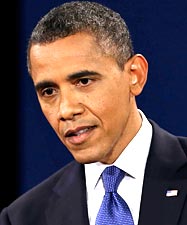
Obama has proposed a budget that would shrink the deficit to 3% of gross domestic product — about 60% smaller than the current level. That's roughly the expected rate of economic growth, so achieving that goal would stabilize the debt as a share of the national economy, keeping the government's fiscal problems from getting worse.
The president's plan would reduce government spending to an average of 22.5% of GDP over the next 10 years, down from the current level of 24%.
Romney would cut more deeply to cap federal spending at 20% of GDP. He would not cut defense spending, so getting to that level would require major reductions in a host of domestic programs, with the biggest single cut hitting Medicaid, the government program that provides medical care for the poor and disabled and covers about 40% of the nation's long-term care bills for the elderly.
Even so, his plan would defer the balance to the future, in large part because of new tax cuts it would include. In a recent television interview he said that the goal of a balanced budget was "eight to 10" years off.
"I'll balance the budget by the end of my second term," he added. "Doing it in the first term would cause, I believe, a dramatic impact on the economy — too dramatic."
The difference between the two candidates' spending plans — 2.5% of GDP — may not seem huge, but it amounts to approximately $6.8 trillion over the decade.
Whether either candidate's plan would ever enable the budget to balance is unclear. Obama administration officials say that if they can stabilize the deficit at 3% of GDP, the administration and Congress could work on a longer-term plan to bring revenues and expenses into line.
Oct. 12, 2012
1:09 p.m.
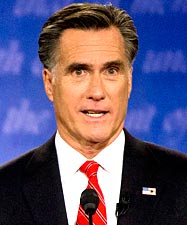
Romney's plan could produce a much larger deficit, depending on how he handles the new tax cut he has proposed. He has said he would offset the loss of revenue from his tax cut by eliminating existing deductions and credits, but has refused to specify any. If he failed to offset the impact of the tax cut, his plan would swell the deficit by roughly $180 billion to $200 billion a year.
Finding enough new revenue to offset the tax cuts would be very difficult, both mathematically and politically. Martin S. Feldstein, a Romney advisor and former chairman of the Council of Economic Advisors in the Reagan administration, wrote recently in the Wall Street Journal that Romney could raise the revenue he needs by eliminating nearly all deductions, including the current standard deduction, for taxpayers with gross incomes over $100,000 — roughly the upper fifth of U.S. households.
Many families with incomes between $100,000 and $200,000 would see taxes go up in that scenario because they would lose deductions for home mortgages, charitable giving and other popular breaks. Many households with incomes above $200,000 would be net winners since their tax cut would outweigh the loss of deductions.
Romney has said he would only eliminate deductions and credits for singles earning more than $200,000 and couples over $250,000 — a much smaller group. Studies cited by the Romney campaign show that would not cover the full cost of his proposed tax cut.
Most recently, Romney has suggested he might support a proposal to set an overall cap on the total amount of deductions a taxpayer could claim. That would raise revenue while avoiding a difficult political fight over each individual deduction. Romney has offered several different figures on how large such a cap might be and hasn't said at what income level he would impose it.
"We're going to have to reduce the deductions pretty substantially for people at the high end, because I don't want to make the code less progressive. I want high-income people to continue to pay the same share they pay today," he said in a recent CNN interview. In any such plan that cuts overall rates but limits deductions, some taxpayers would see a tax increase while others would get a tax cut, depending on their individual circumstances.
A separate study by the Tax Policy Center, a Washington think tank, estimated that Romney would have to raise taxes on many families with incomes down to about $75,000 to make his proposed tax cut "revenue neutral." The Romney campaign has disputed the Tax Policy Center's conclusions.
Romney also has argued that his plans would increase economic growth, which would generate additional federal revenue. Many economists dispute whether cutting tax rates would have a significant impact on economic growth, at least over the next several years.
Oct. 12, 2012
1:13 p.m.
The federal government has a big long-term budget problem: More than 40 cents of every dollar it spends goes to retirees — mostly for Medicare and Social Security — and as the huge baby boom generation ages, those programs take an ever-larger piece of the pie.
Three ways exist to deal with that problem: Faster economic growth would make the pie bigger. Alternatively, there are tax increases or benefit cuts.
Social Security is the easier of the two programs because its costs aren't rising as quickly.
Oct. 12, 2012
1:15 p.m.
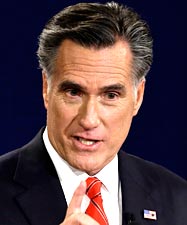
Romney proposes that the Social Security eligibility age, already rising to 67, be increased by a couple of years, starting with people who are currently younger than 55.
He also would change the way benefits are calculated so that they grow more slowly for retirees whose earnings put them over an income threshold. Romney hasn't said where the threshold would be. To make the plan work, however, a large percentage of retirees would have to be affected.
Under one prominent Senate GOP proposal similar to Romney's plan, retirees in the top 60% of earners, those making more than $43,412 in 2018, would get less than they would under current law, according to an analysis by the Social Security actuary. Benefits for some recipients would be lower by 30% or more.
Oct. 12, 2012
1:15 p.m.
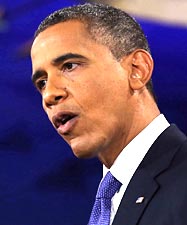
Obama has made no proposal on Social Security. Democrats in the past have proposed increasing revenues by raising the level of earnings subject to the Social Security payroll tax.
During budget talks with congressional Republicans last summer, White House aides discussed reducing future benefits by changing how cost-of-living increases are calculated, but pulled back after opposition from Democrats in Congress.
For now, all White House aides will say is that Obama might be willing to consider some changes in Social Security as part of a "grand bargain" with Republicans on the entire federal budget, but that he would insist that any savings go to bolster Social Security's long-term finances, not to reducing the overall deficit.
Oct. 12, 2012
1:16 p.m.
Medicare poses knottier problems. Not only has the number of recipients increased, but the costs per person have gone up as medical care has gotten pricier. The Congressional Budget Office projects that Medicare spending will go up more than 6% a year for the next decade. That's why the most consequential disagreements between the candidates regarding federal spending involve healthcare.
Oct. 12, 2012
1:18 p.m.
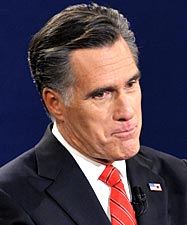
For Medicare, which covers about one-fifth of all healthcare bills in the country, Romney has embraced a plan offered by his running mate, Ryan, who is chairman of the House Budget Committee. Beginning in 2022, people entering the system would not be covered under the current open-ended entitlement but instead would receive what supporters call "premium support."
Seniors would get a fixed amount of money which they could use to buy an insurance plan. If their plan cost less than the government payment, they could pocket the difference. But if their plan cost more than the voucher was worth, seniors would have to pay the difference. The options would include traditional Medicare, but it might cost more than the voucher level.
The key issue in such a plan is how much the government will pay. Romney would peg the value of the voucher to the cost of available health plans in different parts of the country, ensuring that any senior could choose from at least two plans. He has also said that lower-income retirees would get larger vouchers, though he has not detailed how this would work.
Romney also would raise the eligibility age for Medicare from 65 to 67.
Backers of premium support plans argue that they would hold down costs through competition. If seniors can shop around, they'll choose the cheaper insurance plans, the argument goes. Consumers and their insurance carriers would have an incentive to push doctors and hospitals to forego unnecessary treatments or expensive tests that help drive up costs.
Critics doubt that would work. Sick, elderly people may have difficulty picking the right insurance plan for their needs, a problem that exists with similar systems such as the current Medicare Part D drug benefit. And there is some evidence that insurance companies could siphon the healthiest seniors away from Medicare, leaving the government program with only the most expensive patients to treat and driving up its costs.
Ultimately, critics say, premium support would not hold down health costs; it would merely shift the bill from the government to elderly people.
Oct. 12, 2012
1:19 p.m.
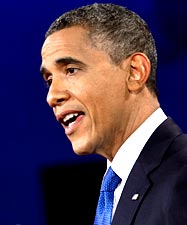
Obama agrees with the critics. Instead of relying on competition among insurance companies to hold down costs, he looks more to regulation. Whether his efforts will succeed in keeping costs down is one of the great unknowns of the healthcare law that was Obama's signature legislative achievement.
The new law includes a number of provisions designed to slow down the increase in healthcare costs both for Medicare and private health plans. The most important puts limits on how much the federal government will pay hospitals and other providers in the future.
The law also includes new initiatives to make care more efficient and reward providers that provide better care, rather than just paying them for every doctor's visit or hospital stay. As a backstop, the law created the Independent Payment Advisory Board, a government-appointed panel that has the authority to further cut payments to providers if Medicare spending increases too rapidly.
Supporters of the law argue that billions of dollars could be saved if doctors and hospitals would simply adopt the best practices already in use in some parts of the country.
Some experts, including Richard S. Foster, Medicare's chief actuary, have warned that if the advisory board cuts payments to providers too much, doctors might decide to stop taking Medicare patients.
Oct. 12, 2012
2:53 p.m.
Obama and Romney once were quite similar on healthcare issues. Romney's biggest legislative achievement as governor was a law guaranteeing health coverage for all Massachusetts residents. That law became the model for Obama's national health plan.
But with his party firmly opposed to Obama's plan, Romney has disavowed any desire to pursue the Massachusetts model. Instead, he has embraced ideas pushed by congressional conservatives that aim to reduce the government's role in the health market and rely more heavily on competition among private firms to hold down costs. Those plans generally do not set a goal of covering all Americans.
For working-age Americans, healthcare poses a stark choice: Obama would implement the law he pushed through Congress in 2010; Romney would try to repeal it.
Oct. 12, 2012
2:55 p.m.
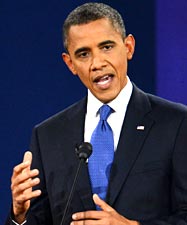
Obama's law aims to make sure all Americans have health coverage. It does so two ways: Middle-income people whose jobs don't provide health coverage will be able to shop for insurance on an Internet-based marketplace known as an exchange, which will allow consumers to compare plans. Many people with moderate to low incomes will get government subsidies to help them buy insurance. The poorest will be eligible for Medicaid, assuming their state doesn't opt out of the program.
Insurance companies will be required to cover everyone regardless of preexisting medical conditions. Insurers cannot charge people more based on their health. Those who do not buy insurance will be required to pay a tax penalty.
Republicans argue the law greatly expands government's reach into Americans' lives and ultimately would be a costly entitlement the nation can't afford. They have promised to repeal it.
Oct. 12, 2012
2:55 p.m.
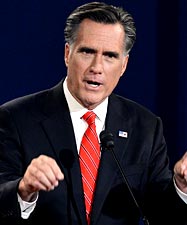
Romney has said that if Congress does not repeal the law, he would act unilaterally, giving states waivers that would allow them not to participate.
He has pledged to replace the law after repealing it, but has said little about what the replacement would be. In a recent television interview, Romney said he would keep protection for some people with preexisting medical conditions. His plan, however, would only protect those who have had "continuous coverage" — those who have kept insurance throughout their lives.
That continuous-coverage rule has been in federal law since 1996, when Congress required that when most people change jobs, they can't be excluded from a new employer's health plan. But the rule does not help people who come new to the insurance market or those who have had a lapse in coverage — for example, those who have been unemployed for a long period of time and without insurance.
Advisors say Romney favors a plan that would give Americans a tax break to buy insurance on their own. That likely would be expensive — a similar plan offered in 2008 by Sen. John McCain would have cost about $1 trillion over 10 years, about the same as the Obama law. Unlike the Obama law, however, it would not have come close to covering everyone.
The argument in favor of that plan is much the same as the one advanced for changing Medicare to a premium support system: Giving people a fixed amount of money and having them buy insurance on the open market will bring down costs by expanding competition.
Critics say the change would leave millions of people uncovered, particularly those who have existing health problems or are too poor to buy insurance even with the tax break. Depending on how the tax system is changed, the shift could also encourage companies to drop their existing health plans.
Romney would also change Medicaid, the joint federal-state program that covers the poor.
Currently, about 70 million people at some point during the year get coverage from Medicaid (Medi-Cal in California) and the related Children's Health Insurance Program. The states and the federal government share the costs, with Washington paying just over half the tab in the wealthiest states and more than three-quarters of the cost in the poorest — West Virginia and Mississippi.
About half of the patients nationwide are children in poor families, but 70% of the costs involve the one-quarter of patients who are disabled or elderly. Low-income seniors often use Medicaid to cover nursing home bills, which are not covered by Medicare. Medicaid covers about 40% of all long-term care costs in the country.
The price tag for Medicaid has doubled in the last decade and now costs the federal government nearly $300 billion a year. Romney aims to cut the program's cost by about $1.5 trillion over the next decade.
He would do so by moving to a system in which Washington gives each state a sum of money, or block grant, that states could spend as they wish to provide care to the poor. The amount of the block grant would increase by no more than 1% beyond overall inflation — far less than the current rate of increase in healthcare costs.
Supporters of the idea say that cutting the funds would give states an incentive to save money and the block grant would give them the flexibility to do so.
Independent analysts, including the Congressional Budget Office, estimate that the cuts in federal spending would be so deep that states would either have to spend much more of their own money — unlikely — or eliminate coverage for millions of poor children and elderly nursing home patients.
Oct. 12, 2012
2:56 p.m.
In almost every speech, Romney criticizes Obama for over-regulating, and he has made cutting regulations in two areas — the financial industry and the environment — a staple of his campaign.
Obama's financial industry regulations stem from the Dodd-Frank law, approved by Congress in 2010. Romney wants the law repealed. He has suggested he wants to replace it with something else, but hasn't said what.
"Dealing with all the new regulatory burden has caused a lot of community banks to pull back at the very time we'd like them to step forward and provide financing to small business," he told reporters recently. "I'd like to get rid of Dodd-Frank and go back and look at regulation piece by piece."
The Dodd-Frank law established a new Consumer Financial Protection Bureau, which started setting up shop last year. The bureau's first enforcement action came in July, when it ordered Capital One to pay $210 million in refunds and fines for allegedly using deceptive marketing tactics on credit card customers. The bureau also has unveiled a simplified mortgage disclosure form, proposed new rules to limit mortgage fees, and started overseeing credit reporting firms.
The law also called for toughening up rules for the nation's banks and investment funds.
Oct. 12, 2012
2:57 p.m.
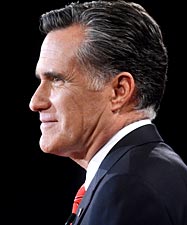
Although he said he would like to have the law repealed, Romney also said he supported regulation to ensure "greater transparency in the trading of derivatives" and "capital requirements for banking institutions so that people don't go out and leverage themselves to the point where any small hiccup could cause the entire institution to fail."
Romney also has criticized Obama for over-regulation on environmental issues. That covers many areas, but the biggest difference involves global warming.
Climate change, like healthcare, is an issue on which Romney's positions have changed almost entirely. As governor, particularly early in his tenure, he viewed climate change as a priority and pushed an ambitious plan to reduce Massachusetts' emissions of carbon dioxide and other greenhouse gases that drive global warming.
In his 2010 book "No Apology: The Case for American Greatness," Romney wrote: "I believe that climate change is occurring — the reduction in the size of global ice caps is hard to ignore. I also believe that human activity is a contributing factor."
In his campaign, however, he has avoided the issue, giving deference to the skepticism that many Republicans express about whether global warming is a real phenomenon. He has promised to push amendments to the Clean Air Act to end the Environmental Protection Agency's power to regulate greenhouse-gas emissions.
Oct. 12, 2012
2:58 p.m.
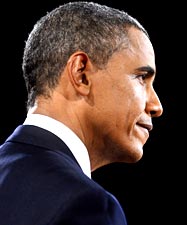
Obama made global warming a significant issue in his 2008 campaign. The administration's major effort on that front, the cap-and-trade bill, passed the House in 2009 but failed in the Senate.
That proposal would have set an overall ceiling on the amount of carbon dioxide that the U.S. economy could produce. The cap gradually would lower, and industries would be allowed to buy and sell permits allowing them to emit carbon dioxide. The idea is that free trading of permits would allow the market to find the least expensive ways to reduce emissions.
In the absence of new legislation, the administration has taken two major regulatory steps to combat global warming. Last year, the administration reached agreement with automakers on a plan that would significantly raise the fuel economy of new U.S. cars, reducing carbon dioxide emissions as a result. Earlier this year, the EPA proposed new rules that would limit emissions by power plants — effectively eliminating nearly all new coal-fired plants.
Obama has not said whether he would push the EPA to take more regulatory actions to limit carbon dioxide emissions in the future if Congress adopts no new legislation.
Romney has said he would seek to roll back the higher fuel economy standards for 2017-2025, which he has labeled unrealistic. He has accused the administration of "waging a war on coal" and has said he would seek to increase coal usage.
Oct. 12, 2012
3:02 p.m.
The Obama and Romney campaigns accuse each other of being "out of the mainstream" on U.S. foreign policy, but despite heated rhetoric, the two candidates have enunciated few significant policy differences. Given the similarities, the real choice for voters is a more subjective one — which man would better achieve the foreign policy goals that both espouse.
Oct. 12, 2012
3:03 p.m.
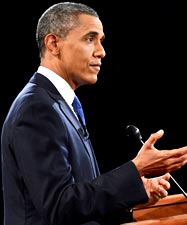
Throughout the Obama years, a fault line has run through the Republican Party on foreign policy. On the one side are people, many of them associated with the George W. Bush administration, who believe the U.S. should use its military power more often to back groups that claim to support democracy.
Sens. John McCain (R-Ariz.) and Lindsey Graham (R-S.C.), for example, have criticized Obama for not intervening more forcefully in Syria and for setting a firm withdrawal date from Afghanistan. Both also criticized the administration's efforts in Libya as insufficient, although that criticism died down once the effort succeeded in topping the regime of Col. Moammar Kadafi.
On the other side, many Republicans have argued for less U.S. involvement overseas. The most prominent person on that side of the debate has been Rep. Ron Paul (R-Texas). But many Republican elected officials who did not back Paul's presidential campaign nonetheless supported a proposal last year to end U.S. involvement in the Libya mission.
Oct. 12, 2012
3:05 p.m.
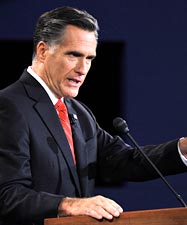
Romney has not resolved that tension within his party and has sometimes appeared to go back and forth between the positions of the two camps. On Afghanistan, for example, Romney initially attacked Obama for setting a 2014 deadline for withdrawal, saying it would embolden the Taliban. Democrats attacked him for advocating a lengthier U.S. commitment to the war.
More recently, Romney has said that he too would withdraw all troops on the same schedule Obama has used or, as he put it in his recent speech at a Veterans of Foreign Wars convention, "complete a successful transition to Afghan security forces by the end of 2014."
On Iran, Romney has attempted to sound tougher than Obama without seeming to commit the U.S. to a war. As Obama has gradually toughened his own language, the two have arrived at a virtually identical position — arguing for strong sanctions backed by a threat of force to try to get Iran's leaders to back away from their nuclear ambitions.
Romney has also sharply criticized Obama for his Middle East policies, saying that he has been disrespectful of Israel. On his late-July trip to Jerusalem, Romney made rhetorical nods to conservative supporters of the Jewish state, who are among his largest financial backers. In speeches, he referred to Jerusalem as Israel's capital. That cheered those who would like the U.S. to move its embassy to Jerusalem from Tel Aviv. He also pointedly did not mention support for a Palestinian state.
But before leaving Israel, Romney gave an interview to CNN in which he tacked back, saying that he supported two separate states for Israelis and Palestinians and that moving the U.S. embassy was a goal to achieve "ultimately."
More recently, Romney has accused the Obama administration of mishandling the unrest that broke out in the Middle East after a video impugning Islam that was produced by a California man began to circulate on the Internet.
Oct. 12, 2012
3:06 p.m.
For more than a decade, the debate in Washington over immigration policy has been stalemated over what to do with the estimated 11 million people — most of them Latino — who are in the U.S. unlawfully.
Latino activists and many Democratic politicians have backed plans that would allow at least some of those people to become citizens. Supporters call that a "path to citizenship," while opponents call it "amnesty."
Opponents of illegal immigration, backed by many Republicans, have argued for stronger measures to control the border and for stepped-up efforts to find and deport illegal residents.
Some prominent Republican strategists have worried that the party's tough stand on immigration could alienate Latino voters for years to come. In the GOP's ranks, however, many voters have strongly held views opposing anything that smacks of amnesty. And other Republican strategists believe that the immigration reform law adopted under President Reagan, which included amnesty for about 2.7 million illegal residents, hurt the party by adding a mostly Democratic group to the voting rolls.
In 2007, President George W. Bush tried to reconcile both sides with a compromise bill that would have given each part of what it wanted. The effort badly divided Republicans and died in the Senate.
Oct. 12, 2012
3:06 p.m.
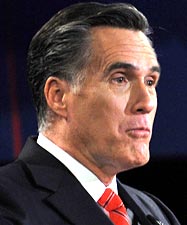
Romney took a tough line during the Republican primaries on immigration, attacking rivals, particularly Texas Gov. Rick Perry, as being soft on the issue. Since the primaries, Romney has largely avoided the subject. He has pledged to complete a high-tech fence along the length of the U.S.-Mexico border, to create a national database that employers would be required to check before hiring anyone, and to expand the temporary worker system to bring in more seasonal farm labor legally. He has promised to oppose any plan that would give illegal residents a leg up on obtaining citizenship.
Oct. 12, 2012
3:07 p.m.
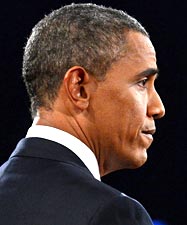
Obama promised in his 2008 campaign that he would push for comprehensive immigration reform including a path to citizenship. He failed to do that. His administration has stepped up deportations of illegal residents — sending a record number out of the country — focusing on those who have committed crimes. The administration also has increased efforts to find and punish companies that illegally hire immigrants who lack work permits.
At the same time, Obama has ordered a halt to deportations of young people who were brought to the U.S. illegally by their parents. He has directed other steps to shield people who have clean records and community ties, whom the administration considers a low priority for deportation. Those steps have been popular with Latino groups, but have been denounced by conservative Republicans as a backdoor amnesty.
Oct. 12, 2012
3:08 p.m.
Gay rights, abortion, stem cell research and related issues that involve conflicting moral values have played a more subdued role in this contest than in the 2004 presidential election, when they figured prominently.
The Obama campaign has pushed the idea that Republicans were waging a "war on women" aimed at restricting access to contraception. The Romney campaign has largely stayed away from those issues but has suffered with some female voters because of strict antiabortion positions in the party platform and high-profile statements by other Republicans. Romney himself took more liberal positions when he was running for governor in Massachusetts.
At least one vacancy on the Supreme Court is all but certain to come up during the next presidential term, and both men have said their views on abortion would play a role in their choice of a justice.
The political balance on gay rights issues has shifted since the 2004 campaign, with the public considerably more supportive of liberal positions on same-sex marriage, for example.
While the issues have been in the background, the candidates do have distinctly different positions.
Oct. 12, 2012
3:10 p.m.

Romney wants the Supreme Court to overturn its Roe vs. Wade decision, which guaranteed a woman's right to get an abortion through the first six months of her pregnancy. Obama supports Roe vs. Wade.
Romney also has pledged to stop federal funds from going to Planned Parenthood.
In an interview with the Des Moines Register in December, Romney said he had not been in favor of allowing gays to serve openly in the military, but "that's already occurred. I'm not planning on reversing that at this stage."
Oct. 12, 2012
3:10 p.m.

Under Obama, the Justice Department has asked the Supreme Court to overturn the federal Defense of Marriage Act, which bars same-sex couples who are legally married from federal benefits that go to other married couples. Romney has pledged to defend the law. Romney also supports amending the Constitution to declare that marriage can only be between a man and a woman. Depending on how the provision is worded, such an amendment could override state laws that allow gay marriage.
| Advertisement |
|
|
This page was created by the Data Desk, a team of reporters and Web developers in downtown L.A.
- Track our latest projects »
- Fork our open-source code on Github »
- Send us e-mail at datadesk@latimes.com »
